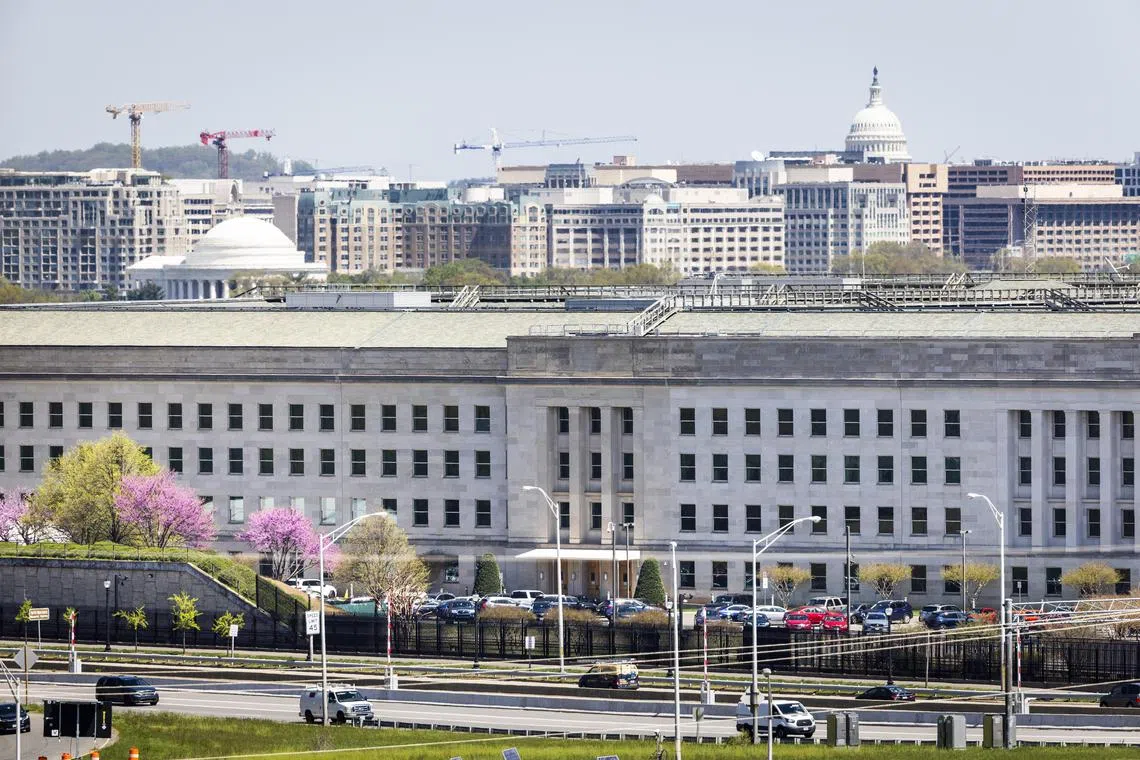US intel leak: Clues left online might aid probe
Sign up now: Get ST's newsletters delivered to your inbox

The Pentagon intelligence materials appear to have been first photographed and then uploaded online.
PHOTO: EPA-EFE
WASHINGTON – A surprisingly large number of people potentially had access to the Pentagon intelligence documents leaked on a social media site in early March,
A series of critical questions hinge on the investigation: Who took the documents and posted them online, and why, and what kind of damage might the release of the material have done?
“We don’t know who is behind this; we don’t know what the motive is,” said Mr John Kirby, spokesman for the National Security Council. “We don’t know what else might be out there.”
Officials at the White House, the Justice Department and the Pentagon said little on Monday about the investigation into the leaked materials, which appear to detail national security secrets on Ukraine, Russia and other countries.
Although some documents were doctored, those revisions appear to have been made later. Officials have acknowledged that many of the documents are genuine, and they were initially posted on the Internet without alterations.
Determining a motive might be difficult, in part because the classified material highlighted weaknesses in the militaries of both Ukraine and Russia,
It is possible, former officials said, that the motivation might not have been overtly political, but those questions will be answered only as the probe continues.
The intelligence materials appear to have been first photographed and then uploaded online, a kind of sloppy procedure that suggests the person leaking the documents probably took few steps to conceal the Internet Protocol (IP) addresses used or the date stamps from photos, said Mr Javed Ali, a former senior US counter-terrorism official who had intelligence roles at the Federal Bureau of Investigation (FBI), the Defence Intelligence Agency and the Department of Homeland Security.
A senior US official said hundreds, if not thousands, of military and other US government officials have the security clearances to gain access to the documents.
The official said the military’s Joint Staff instituted procedures last Friday to limit the distribution of highly sensitive briefing documents and restrict attendance at meetings, where briefing books containing paper copies of the documents were available.
Officials said it was too soon to determine whether the disclosure of the documents would hurt the US’ ability to collect information inside Russia.
A senior US military official said that as at April 8, there were no indications that Russia had plugged any of the information leaks that US and other Western intelligence services had tapped and passed on to Ukrainian officials to help them strike Russian targets.
That suggested that Russia, like senior Pentagon officials, only recently learnt of the disclosures even though the files had sat on Discord, a social media messaging platform, since early March, analysts said.
Mr Christopher Meagher, chief Pentagon spokesman, declined to answer most questions about the investigation, citing a criminal inquiry started by the Justice Department and the FBI.
The Pentagon is leading a separate inter-agency team, including the White House, the State Department and intelligence agencies, to determine the damage caused by the disclosures, and to assess what more needs to be done to address the leak.
“That includes taking steps to take a closer look at exactly how this type of information is distributed and to whom, but beyond that, I’m not going to get into any more specifics,” Mr Meagher said.
He said that Defence Secretary Lloyd Austin was initially briefed on the leak on the morning of April 6. On April 7, Mr Austin began convening department-wide meetings to address the growing disclosures.
“The Secretary and Department of Defence and the US government take this apparent unauthorised disclosure extremely seriously,” Mr Meagher said. “This is a top priority for us.”
Mr Meagher also said Pentagon officials and other US officials began contacting congressional leaders and allies over the weekend to alert them to the leaks, which have already complicated relations with some countries.
“The reports of intelligence leaks are incredibly concerning,” Representative Mike Rogers, chairman of the House Armed Services Committee, said on Monday. Mr Rogers said the panel was “actively seeking answers from the Department of Defence”.
Mr Ali said the classified materials that were disclosed would have been electronically contained in stand-alone computer systems that are not connected to the broader Internet.
The computers reside in secure work areas known as SCIFs – sensitive compartmented information facilities – where no one is allowed to bring in any electronic devices that could be used to take photographs or make video or audio recordings.
Anyone involved in the production of these daily products would have been cleared at the highest levels, he said.
“While these protocols might help narrow the pool of individuals who could have been responsible, it will still entail a major investigative process where hundreds or thousands of people will have to be interviewed,” said Mr Ali, who is now at the University of Michigan’s Gerald R. Ford School of Public Policy.
That the intelligence materials appear to have been first photographed and then uploaded online may help investigators forensically determine the points of origin of such activity by tracking IP addresses and date/time stamps from photographs unless efforts were made to conceal these signatures, Mr Ali said.
The documents included information about intelligence that the US had gathered on allies including South Korea and Israel and partners such as Ukraine.
Mr Kirby did not answer specific questions but said “US officials have been in touch with relevant allies and partners”. NYTIMES


